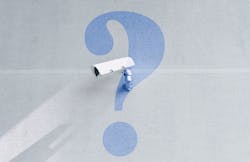Deciding how to protect your business, along with the equipment and employees inside of it, is a daunting task. With ever-changing technology and monitoring structures, it’s easy to feel overwhelmed. Shop owners need to be able to decipher what types of security measures they want to take, what equipment works best for them, how their system is going to be monitored and how much they are willing to invest.
Generally speaking, most shop owners should include two types of equipment to protect their shops, says Mary Abeln, co-owner of Trust Security in Edina, Minn. Abeln has worked with countless independent shops to assist in designing security configurations that help protect owners. She says a set of cameras and an alarm system should be security staples for shops of all sizes.
“Paying for a good alarm and camera system that are easy to use and provide you with actual data is worth it to every business owner,” Abeln says.
This set of equipment will protect from external theft as well as internal—which Abeln says typically makes up the majority of shop theft. Cameras and alarms also protect owners from issues with onsite injury, overall personal safety and peace of mind.
“You have insurance all over the place in your shop, this is just another piece of that pie, the insurance pie,” says Abeln.
Alarm systems are customizable to each shop’s pricing and protection needs, says Abeln, but typically work the same. The slew of options, varieties, and forms of technology come into play while choosing camera types.
Here is a breakdown of the components, price, and benefits of the two most popular types of security cameras on the market.
System Overview
Wired
Wired security cameras are what most think of when picturing traditional cameras, Abeln says. The camera is connected to a DVR (digital video recording) system somewhere in the back of the shop. The DVR is where the camera memory and images are stored. This system will provide constant shots of everything happening inside (and outside if a camera is installed to the exterior). Meaning, each and every moment is captured in a video frame, Abeln explains.
Wired cameras also allow for the user to connect the image stream to the internet, allowing the owners to see what’s going on at their businesses from their smartphones or computers while in or away from the shop.
This type of camera system takes more energy, has a more complicated installation process, and a higher price point than wireless security cameras, Abeln explains.
Wireless
Wireless cameras are a more modern camera design, but the name can be misleading, and doesn't necessarily mean the cameras are truly wireless—they still need power, Abeln says. This camera type is not connected to a DVR, or to any physical storage device. Instead, all images are stored in the cloud, she explains.
One of the other larger differentiating factors of wireless cameras is the amount of images it produces. The frame coverage of wireless cameras will not be a continuous stream, unlike the frames that wired cameras produce. Instead, the camera will take a larger number of images only when triggered by an event that it’s set up for, like specific motion or an alarm.
Wireless cameras take less energy, installation time and have a lower price point, but due to the lack of continuous stream, may miss monumental events happening between frames.
“What a shop owner needs to be thinking about is, ‘Am I going to get enough images [from a wireless camera]?’ because it’s not a continuous play on the camera,” Abeln says.
Pay Range
Wired
The number of cameras shop owners should invest in depends on how big the shop is, and how much coverage the owner is looking for, says Abeln.
“You can always customize it (your camera set up) to what you want, and what you feel like you need,” she says.
The exact number of security cameras that a shop should look into investing in can be determined by working with a security company service advisor.
“A service advisor helps you come up with a plan that protects your perimeter to observe your employees, your customers, and those people out in front of your business,” says Abeln.
Typically, a smaller shop would probably use around four cameras, Abeln explains, three cameras for inside the shop and one for the outside. A good rule of thumb is to think about each wired camera being priced at around $1,000, with the figure being all-inclusive, and including more than the physical equipment: The $4,000 price tag would get a shop owner the four cameras, installation, and a DVR. Adding the internet component would be an extra monthly cloud storage fee.
Wireless
A wireless camera system would be around $300 per camera, Abeln says. Although a lower price point, Abeln says users should expect to pay a higher monitoring rate that includes mandatory cloud storage—considering all images will be stored in the cloud rather than on a physical DVR.
It is important to factor in the possibility that the lower price point of wireless cameras does include the risk of losing money in the future, Abeln explains. As the exact shot of the theft or the incident may not be caught due to the non-continuous stream.
Monitoring
Regardless of the type of camera chosen, the stream of images needs to be monitored. If the decision was made to have the equipment professionally monitored by ADT, Vivant, or another monitoring company, owners should expect to spend somewhere between $40 and $60 per month, says Abeln.
“The equipment is basically all the same [through every security company], we all have access to the same solutions. What makes the difference is the monitoring,” Abeln says.
She says that the most important factor is to know where your security provider is monitoring from. Relying on smaller monitoring companies may run the risk of lack of availability or support when needed. Since the lower number of employees means a lower number of people that are monitoring the shop’s security system.
“If you cannot verify who is doing the monitoring than you shouldn't do business with that company,” Abeln says.
Monitored security systems can give the advantage of a possible insurance discount when demonstrated that the shop has both a security system and is being professionally monitored, says Abeln—considering these security methods help to protect shops from theft, injury, and possible life dangering situations.
“Lives are the most important thing, and a security system is a deterrent to keeping people out,” Abeln says.
A Shop Owner's Setup
—
Aaron Smith, owner of S&S Auto Repair, has run the Chattanooga, Tenn., 10-bay shop for the last six years. Around that same time, the shop invested in a boxed camera system and a DVR; Smith says the system worked fine, but, in the last couple of years, he noticed the camera’s poor resolution.
“After I did some research, we noticed it was more important to invest in a good camera system,” Smith says.
S&S Auto Repair now utilizes a set of 10 wired cameras throughout the shop. Smith says he decided to go with a wired system over wireless because of the shop’s size and the system’s reliability.
“We’re not a small shop; we have 10,000 square feet, 10 bays, and it’s all inclosed, so in order to run a wireless system your going to have to be able to link that to multiple access points,” Smith explains.
He says that wired systems allow for faster access than waiting on a network. Wireless systems also run the risk of the network being down, resulting in a loss of coverage.
“I’m not dependant on access points in order to record everything that’s going on,” Smith says.
Each of Smith’s cameras have the ability to record in 1080i and are placed strategically throughout his business; there are cameras on the shop floor, the front customer area, the parts department, and various other locations inside and outside the shop.
Smith says the upgrade to HD has made the quality of the security camera footage a high enough quality that he can zoom in on specific cars or individuals with clarity if needed. The cameras help with monitoring potential outside theft and vandalization, company theft, liability issues and to simply keep an eye on the shop. He can monitor his system while being inside or away from his business.
“Having access to those camera systems on our phones while we were away on vacation, or away at a conference, or with family is crucial,” he says.
Smith says that wired systems tend to cost a little more, but the stronger connectivity and dependability make the added expense worth it.
Although Smith utilizes wired cameras, he assures that any camera system that a shop can afford is a good investment.
“No camera system is a bad thing, so any kind of camera system that you can use for the time being within your budget is best. However, once you're able to afford something a little bit better, it’s always best to get that system,” he says.

